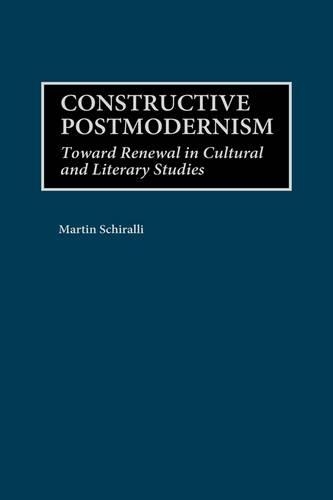
Constructive Postmodernism: Toward Renewal in Cultural and Literary Studies
(Hardback)
Publishing Details
Constructive Postmodernism: Toward Renewal in Cultural and Literary Studies
By (Author) Martin Schiralli
Bloomsbury Publishing PLC
Praeger Publishers Inc
30th November 1999
United States
Classifications
Tertiary Education
Non Fiction
Philosophy
Literature: history and criticism
149.97
Physical Properties
Hardback
176
Width 156mm, Height 235mm
369g
Description
Are indeterminancy and relativism the only possible consequences of embracing the uncertainties of the postmodern era Are other less deconstructive options to be found emmbedded in postmodernism's many ambiguities In arguing affirmatively to both questions, this study pointsin a constructively postmodern waytoward renewal in literary and cultural theory. Divided into two parts, this book first examines the two distinct sourcesconstructive and deconstructiveof the postmodern attitude. The first, exemplified in the work of Derrida, Lyotard, and Baudrillard, is presented as a reaction against the reductive excesses of 20th-century modernism and is characterized by ambivalent and indeterminate approaches to uncertainty. The second source is more subtly discerned in the rejection by Wittgenstein and Dewey, among others of the Cartesian or modern conception of rationality in favor of more situationally complex, naturalistically grounded accounts of experience. Although the two approaches overlap in their acceptance of uncertainty and complexity, constructive postmodernism is shown to offer more scope for productive and cumulative study of meaning and value. The second part applies the principles embedded in constructive postmodern thinking to the field of literary theory and criticism. The constructively postmodern pursuit of ever more richly observed and detailed, more ordinary and transparent situations is shown to be of particular relevance to literary studies. What precisely does the achievement of a writer like Jane Austen or Henry James represent, if not pointedly detailed observations of densely complex social and interpersonal relations, mediated by a painfully acute and sophisticated sensibility, and imaginatively represented as works of fiction The answer to this question is presented by exploring the concepts of social and emotional intelligence in the novels of Austen and James among four other novelists.
Reviews
"This bold, far-reaching book avoids the fanaticism that, as Schiralli notes, has marred all too much recent debate in the humanities....Humanists teaching literature will find much of value in this graceful volume --and along with their colleagues in philosophy, these scholars will benefit from study of this well-argued analysis."-Journal of Aesthetic Education
Humanists teaching literature will find much of value in this graceful volume--and along with their colleagues in philosophy, these scholars will benefit from study of this well argued analysis.-Commentary
"Humanists teaching literature will find much of value in this graceful volume--and along with their colleagues in philosophy, these scholars will benefit from study of this well argued analysis."-Commentary
Author Bio
MARTIN SCHIRALLI is Associate Professor, Faculty of Education, Queen's University, Ontario, Canada./e
